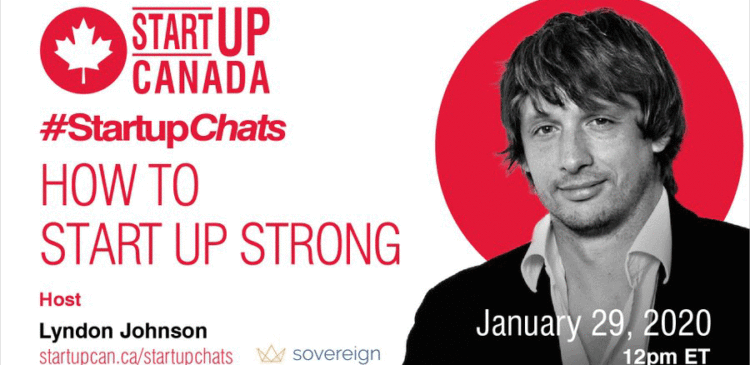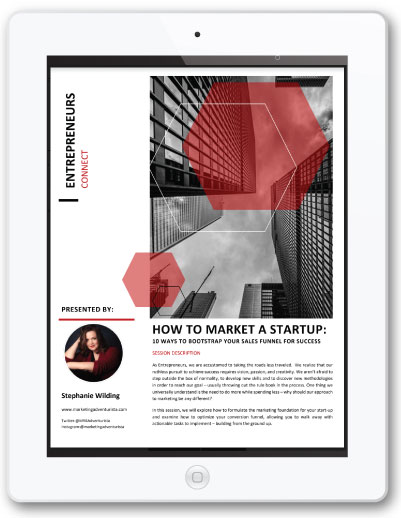Startup Canada #StartupChats – How To Start Up Strong Recap

How To Start Up Strong: Here is a recap of today’s Startup Canada #Startupchat, where we explored How To Startup Strong. The event had 39 contributors, 29.7 million impressions!
Q1 First question! When starting your new business year, why is it important to evaluate your prior year’s results? @SovInsurance #StartupChats pic.twitter.com/QL3RrRqKXv
— Startup Canada (@Startup_Canada) January 29, 2020
My Advice: I love data, which is fitting as I offer data-driven marketing solutions. I believe you should be reviewing your results on a monthly basis. This helps you track your progress in reaching your goals & by doing so on a monthly basis you have a better chance at catching any issues as they begin to occur. Also by tracking on a monthly basis, it breaks down the amount of work you face at year-end when revisiting your goals & writing your next year’s business plan. I have built a tool in excel that allows me to track my monthly revenue vs. the goal, my leads, prospects, proposals submitted, & my close rates. All of these results help me set achievable goals for the coming year. @SovInsurance #StartupChats How To Start Up Strong!
Q2 How much time should you spend evaluating your prior year’s results versus moving ahead with your new annual plan? @SovInsurance #StartupChats pic.twitter.com/4VImkReieN
— Startup Canada (@Startup_Canada) January 29, 2020
My advice: Your new annual plan should be based on your previous year’s results, the lessons learned, and from there, your next year’s goals should be set. Once the plan has been created it should be full steam ahead. As I mentioned I track monthly so pulling all of the results together & building out my new plan usually happens over two weeks, during the Christmas holiday break. @SovInsurance #StartupChats
Q3 What are the top three things business owners need to focus on at the beginning of a year? @SovInsurance #StartupChats pic.twitter.com/Wpbfi2YqNW
— Startup Canada (@Startup_Canada) January 29, 2020
My advice: Businesses can differ significantly, so in general, I would say the previous year’s results, the results you would like to achieve in the coming year & how those yearly results break down into trackable monthly goals. @SovInsurance #StartupChats #StartupChats
Q4 Stop using paper, get digital and spend more time interacting with your clients and staff than taking notes. What are the best voice to text tools for entrepreneurs to save time with note-taking and filing? @cocacola_ca #StartupChats #StartupWomen pic.twitter.com/J6yGLi5WTs
— Startup Canada (@Startup_Canada) January 24, 2020
My advice: Indicators can be external & internal, I have clients in the US & the current political climate & recent events, causes instability with ongoing & upcoming projects, which lead to an adjustment in my business goals & re-evaluate my insurance. Internal signals come from customer service & satisfaction feedback channels. I work to keep my processes & practices fluid to improve & streamline. @SovInsurance #StartupChats
Q5 What part of your annual business plan is most likely to change from what you expected it to be? @SovInsurance #StartupChats pic.twitter.com/okgRw4IHtq
— Startup Canada (@Startup_Canada) January 29, 2020
My advice: The marketing plan adjusts to reflect what is working & what doesn’t seem to be working, which can cause fluctuation in the budget. The goals tend to shift as well throughout the year based on results & other changes. @SovInsurance #StartupChats
Q6 What approaches can entrepreneurs take to implement change while motivating high performance from their employees? @SovInsurance #StartupChats pic.twitter.com/l99jBU7god
— Startup Canada (@Startup_Canada) January 29, 2020
My advice: As a solopreneur who will be expanding shortly, I am interested in seeing what the other advisors have to recommend. @SovInsurance #StartupChats
Q7 If change initiatives are identified in your annual business plan, what are some change management best practices? #StartupChats pic.twitter.com/eRmd8pPmIc
— Startup Canada (@Startup_Canada) January 29, 2020
My advice: As a solopreneur I don’t have any internal buy-in to worry about, but if the changes affect external project stakeholders, such as my clients, I make sure to include them in the process & seek out their perspective & feedback. This ensures they are part of the process & we end up with solutions that work for everyone one involved. I also make sure to document my processes for future reference & to on-board support should I need it. @SovInsurance #StartupChats
Q8 Strong businesses mitigate risks. What advice do you have for entrepreneurs to identify and mitigate risks from the start of the year? @SovInsurance #StartupChats pic.twitter.com/bfjR2gVKUG
— Startup Canada (@Startup_Canada) January 29, 2020
My Advice: While writing your yearly business plan it should include a section that outlines the possible risks associated with your goals/business & what possible solutions could be implemented. By getting these out onto paper (or rather your PC) it gets you thinking about what can go wrong, how to fix these issues & perhaps what can be done to prevent them entirely. This also allows you to have a game plan to fall back on should you find yourself in the middle of a crisis. @SovInsurance #StartupChats
Q9 Why is it important to review your insurance coverage when you create your annual business plan? @SovInsurance #StartupChats pic.twitter.com/GZWJqiNCWj
— Startup Canada (@Startup_Canada) January 29, 2020
My advice: It is important to review your insurance & your coverage while writing your yearly business plan to ensure that your goals & any changes in direction for your business will still be covered. For example, when I started signing clients in the US, my insurance went up based on the % of revenue generated outside of the province my business is located in. @SovInsurance #StartupChats
Q10 How can entrepreneurs stay the course with their long-term strategy while identifying specific focus areas in their annual plans? @SovInsurance #StartupChats pic.twitter.com/BPVFo1GvhL
— Startup Canada (@Startup_Canada) January 29, 2020
My advice: I find that the best way to achieve this is by breaking down your long-term goals into what needs to happen in 5 years, 3 years, 2 years & the current year. This will help you outline the tasks or steps that need to be taken in order to process towards & ultimately achieve your goals, along with the KPIs to track the process at each scale level. This can work with revenue targets, expansion plans, customer service ratings, audience growth, etc. @SovInsurance #StartupChats
Q11 What is your final top piece of advice to set entrepreneurs up for success with their annual planning process? @SovInsurance #StartupChats pic.twitter.com/AGNXOfT2K0
— Startup Canada (@Startup_Canada) January 29, 2020
My advice: Start thinking things through & pulling together the info you need in Oct. with the goal of completing the plan in Dec. This will allow you to think things through & revisit it over the course of a couple of months. This will allow you to get your pipeline & marketing activities organized ahead of time & hit the ground running in Jan. If you wait to write it every Jan. you will need to include ramp-up time in your goal setting & might cut yourself short. @SovInsurance #StartupChats
Closing off:
How To Start Up Strong is an important factor and as #entrepreneurs one thing we universally understand is the need to do more while spending less – why should our approach to marketing be any different?
If this sounds like you, check out my free ebook ‘How to Market a Startup: 10 ways to bootstrap your sales funnel for success. #StartupChats

As Entrepreneurs, we are accustomed to taking the roads less traveled. We realize that our ruthless pursuit to achieve success requires vision, passion, and creativity. We aren’t afraid to step outside the box of normality, to develop new skills and to discover new methodologies in order to reach our goal – usually throwing out the rule book in the process. One thing we universally understand is the need to do more while spending less – why should our approach to marketing be any different?
This ebook has been constructed from the handout from my 45-minute workshop, where we explored how to formulate the marketing foundation for a startup or small business and examine how to optimize a conversion funnel. The eBook allows you to walk away with actionable tasks to implement – building your marketing foundation from the ground up.
To check out the awesome advice from all of the advisors who participated in this How To Start Up Strong chat, view this thread on Twitter





